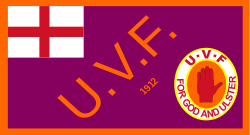Ulster Volunteer Force (1966)
| Ulster Volunteer Force (UVF) | |
|---|---|
| Participant in the Troubles | |
 
Above: the UVF emblem, with the Red Hand of Ulster and the motto "For God and Ulster"
Below: the UVF flag |
|
| Active | May 1966 – present (on ceasefire since October 1994; officially ended armed campaign in May 2007) |
| Ideology |
Ulster loyalism British unionism |
| Leaders | Brigade Staff |
| Headquarters | Belfast |
| Area of operations |
Northern Ireland (mostly) Republic of Ireland |
| Strength | Unknown |
| Allies | Red Hand Commando |
| Opponents |
Irish Republican Army Irish republicans Irish nationalists |
The Ulster Volunteer Force (UVF) is an Ulster loyalist paramilitary group in Northern Ireland. It emerged in 1966 and is named after the original UVF of the early 20th century. Its first leader was Gusty Spence, a former British soldier. The group undertook an armed campaign of almost thirty years during the Troubles. It declared a ceasefire in 1994 and officially ended its campaign in 2007, although some of its members have continued to engage in violence and criminal activities. The group is classified as a terrorist organisation by the United Kingdom, Republic of Ireland and United States.
The UVF's declared goals were to combat Irish republicanism – particularly the Irish Republican Army (IRA) – and to maintain Northern Ireland's status as part of the United Kingdom. It was responsible for more than 500 deaths. The vast majority (more than two-thirds) of its victims were Irish Catholic civilians, who were often killed at random. During the conflict, its deadliest attack in Northern Ireland was the 1971 McGurk's Bar bombing, which killed fifteen civilians. The group also carried out attacks in the Republic of Ireland from 1969 onward. The biggest of these was the 1974 Dublin and Monaghan bombings, which killed 34 civilians, making it the deadliest terrorist attack of the conflict. The no-warning car bombings had been carried out by units from the Belfast and Mid-Ulster brigades. The Mid-Ulster Brigade was also responsible for the 1975 Miami Showband killings, in which three members of the popular Irish cabaret band were shot dead at a bogus military checkpoint by gunmen in British Army uniforms. Two UVF men were accidentally blown up in this poorly planned attack. The UVF's last major attack was the 1994 Loughinisland massacre, in which its members shot dead six Catholic civilians in a rural pub. Until recent years, it was noted for secrecy and a policy of limited, selective membership. The other main loyalist paramilitary group during the conflict was the Ulster Defence Association (UDA), which had a much larger membership.
...
Wikipedia
